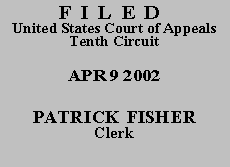

| TERRY LEE ABBOTT, |
|
Petitioner filed pro se this application for a writ of habeas corpus pursuant to 28 U.S.C. § 2254. The district court denied the application as barred by the one-year limitation period for filing a petition for a writ of habeas corpus. The district court denied a certificate of appealability (COA). Petitioner seeks a certificate of appealability in this court.
In 1986, petitioner Abbott was convicted as a habitual criminal and sentenced to life imprisonment. In his habeas petition Mr. Abbott challenged the validity of the prior convictions used to support his convictions. He also claimed ineffective assistance of counsel and error by the state courts in upholding the validity of the prior convictions. In 1999, petitioner Abbott filed a previous habeas corpus petition which was dismissed without prejudice for failure to prosecute. In those proceedings the district court denied petitioner's motion for extension of time to file a notice of appeal and application for COA. That order was affirmed on appeal by this court. Abbott v. Southers, 00-1089, 2000 WL 1716461 (10th Cir. Nov. 16, 2000).
We construe the application for a writ of habeas corpus and all other papers filed by Mr. Abbott liberally because he is proceeding pro se. Haines v. Kerner, 404 U.S. 519, 520-21 (1972). The magistrate judge and the district court in this case reviewed thoroughly the time periods during which petitioner could have filed this petition for a writ of habeas corpus and did not. Mr. Abbott's conviction and sentence became final in 1986. He did not file a direct appeal. It is clear that he was aware of the factual predicate for his claims by 1993 when he raised those claims in state court. Petitioner is not now asserting a right newly recognized by the Supreme Court. We agree with the district court that the one year limitation period began to run on April 24, 1996, the date that the one-year limitation period was enacted into law. United States v. Simmons, 111 F.3d 737, 746 (10th Cir. 1997).
The district court deemed this action filed on July 12, 2001 pursuant to application of the prisoner mailbox rule. Houston v. Lack, 487 U.S. 266, 270 (1988). Thus, this action was filed more than five years after the one-year limitation period began to run. The district court also thoroughly analyzed whether there was any period of tolling that should apply to petitioner's action. The district court correctly tolled this action from April 24, 1996, though August 3, 1998, while the state post-conviction proceedings were pending. Nevertheless, the district court correctly calculated the time periods that were not tolled and deemed this habeas corpus application barred by the one-year limitation period found in 28 U.S.C. § 2244(d). We agree with that determination.
To be entitled to a COA in this court Mr. Abbott must make "a substantial showing of the denial of a constitutional right." 28 U.S.C. § 2253(c)(2). He can make this showing by establishing that "reasonable jurists could debate whether (or, for that matter, agree that) the petition should have been resolved in a different manner or that the issues presented were adequate to deserve encouragement to proceed further." Slack v. McDaniel, 529 U.S. 473, 484 (2000) (quotation omitted).
We may grant habeas relief only if the state court entered a judgment that
(1) resulted in a decision that was contrary to, or involved an unreasonable application of, clearly established Federal law, as determined by the Supreme Court of the United States; or
(2) resulted in a decision that was based on an unreasonable determination of the facts in light of the evidence presented in the State court proceeding.
28 U.S.C. § 2254(d).
Because we agree with the calculations of the district court with respect to the tolling and the filing deadlines in this case, we deny the certificate of appealability. The motion to proceed in forma pauperis is granted.
ENTERED FOR THE COURT,
Deanell Reece Tacha
Chief Circuit Judge
*.This order and judgment is not binding precedent, except under the doctrines of law of the case, res judicata, and collateral estoppel. This court generally disfavors the citation of orders and judgments; nevertheless, an order and judgment may be cited under the terms and conditions of 10th Cir. R. 36.3.